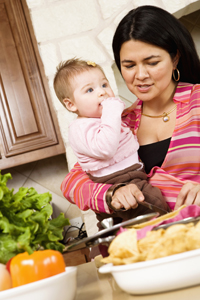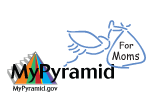
The USDA’s online, interactive tool MyPyramid Plan for Moms can help you choose foods based on your baby’s nursing habits and your energy needs. You can learn how to:
- Figure out how much you need to eat
- Choose healthy foods
- Get the vitamins and minerals you need.
Nutrition and fitness
Healthy eating
Many new mothers wonder if they should be on a special diet while breastfeeding, but the answer is no. You can take in the same number of calories that you did before becoming pregnant, which helps with weight loss after birth. There are no foods you have to avoid. In fact, you can continue to enjoy the foods that are important to your family — the special meals you know and love.
As for how your diet affects your baby, there are no special foods that will help you make more milk. You may find that some foods cause stomach upset in your baby. You can try avoiding those foods to see if your baby feels better and ask your baby’s doctor for help.
Keep these important nutrition tips in mind:
- Drink plenty of fluids to stay hydrated (but fluid intake does not affect the amount of breast milk you make). Drink when you are thirsty, and drink more fluids if your urine is dark yellow. A common suggestion is to drink a glass of water or other beverage every time you breastfeed. Limit beverages that contain added sugars, such as soft drinks and fruit drinks.
- Drinking a moderate amount (up to 2 to 3 cups a day) of coffee or other caffeinated beverages does not cause a problem for most breastfeeding babies. Too much caffeine can cause the baby to be fussy or not sleep well.
- Vitamin and mineral supplements can not replace a healthy diet. In addition to healthy food choices, some breastfeeding women may need a multivitamin and mineral supplement. Talk with your doctor to find out if you need a supplement.
- See our Breastfeeding fact sheet for information on drinking alcohol and breastfeeding.
Can a baby be allergic to breast milk?
Research shows that a mother’s milk is affected only slightly by the foods she eats. Breastfeeding mothers can eat whatever they have eaten during their lifetimes and do not need to avoid certain foods. Babies love the flavors of foods that come through in your milk. Sometimes a baby may be sensitive to something you eat, such as dairy products like milk and cheese. Symptoms in your baby of an allergy or sensitivity to something you eat include some or all of these:
- Green stools with mucus and/or blood, diarrhea, vomiting
- Rash, eczema (EG-zuh-muh), dermatitis, hives, dry skin
- Fussiness during and/or after feedings
- Crying for long periods without being able to feel consoled
- Sudden waking with discomfort
- Wheezing or coughing
Babies who are highly sensitive usually react to the food the mother eats within minutes or within four to 24 hours afterwards. These signs do not mean the baby is allergic to your milk itself, only to something you are eating. If you stop eating whatever is bothering your baby or eat less of it, the problem usually goes away on its own. You also can talk with your baby’s doctor about any symptoms. If your baby ever has problems breathing, call 911 or go to your nearest emergency room.
Vegan diets
If you follow a vegan diet or one that does not include any forms of animal protein, you or your baby might not get enough vitamin B12 in your bodies. This can also happen if you eat meat, but not enough. In a baby, this can cause symptoms such as loss of appetite, slow motor development, being very tired, weak muscles, vomiting, and blood problems. You can protect your and your baby’s health by taking vitamin B12 supplements while breastfeeding. Talk to your doctor about your B12 needs.
Fitness
An active lifestyle helps you stay healthy, feel better, and have more energy. It does not affect the quality or quantity of your breast milk or your baby’s growth. If your breasts are large or heavy, it may help to wear a comfortable support bra or sports bra and pads in case you leak during exercise. It is also important to drink plenty of fluids. Be sure to talk to your doctor about how and when to slowly begin exercising following your baby’s birth.
For more information on fitness, visit our Fitness and nutrition section.
More information on nutrition and fitness
Explore other publications and websites
-
Breastfeeding — Self-Care — This publication provides general recommendations for breastfeeding mothers. It also includes information on the effects of alcohol, caffeine, and other substances during breastfeeding.
http://www.nlm.nih.gov/medlineplus/ency/article/002454.htm
-
Breastfeeding FAQs: Your Eating and Driking Habits (Copyright © Nemours Foundation) — This publication provides current breastfeeding moms and soon-to-be breastfeeding moms with ways to eat a proper diet and tips on what foods and beverages to avoid when breastfeeding.
http://kidshealth.org/parent/food/infants/breastfeed_eating.html
-
Exercise After Pregnancy: How to Get Started (Copyright © Mayo Foundation) — This online resource explains why being physically active is important and provides suggestions for exercises to try after pregnancy.
http://www.mayoclinic.com/health/exercise-after-pregnancy/MY00477/
-
Pregnancy & Breastfeeding — When you are pregnant or breastfeeding, you have special nutritional needs. This website is designed just for pregnant and breastfeeding women and includes important advice to help keep mothers and babies healthy.
http://www.mypyramid.gov/mypyramidmoms/index.html
-
Pregnancy, Breastfeeding, and Bone Health — This publication provides information on pregnancy-associated osteoporosis, lactation and bone loss, and what you can do to keep your bones healthy during pregnancy.
http://www.niams.nih.gov/Health_Info/Bone/Bone_Health/Pregnancy/default.asp
-
Will My Milk Supply be Affected If I Exercise? (Copyright © La Leche League International) — This publication provides tips on resuming exercise after having a baby and during breastfeeding. It provides important points to consider before starting to exercise again.
http://www.llli.org/FAQ/exercise.html
Connect with other organizations
-
La Leche League International
http://www.llli.org/
-
Maternal and Child Health Bureau, HRSA, HHS
http://www.mchb.hrsa.gov/
-
National Center for Education in Maternal and Child Health
http://www.ncemch.org/
-
Nutrition.gov
http://www.nutrition.gov/
-
Womenshealth.gov, OWH, HHS
http://www.womenshealth.gov/
Content last updated August 1, 2010.
Resources last updated August 1, 2010.
womenshealth.gov
A federal government website managed by the Office on Women's Health in the Office of the Assistant Secretary for Health at the U.S. Department of Health and Human Services.
200 Independence Avenue, S.W. • Washington, DC 20201


 Text size
Text size Email
Email

